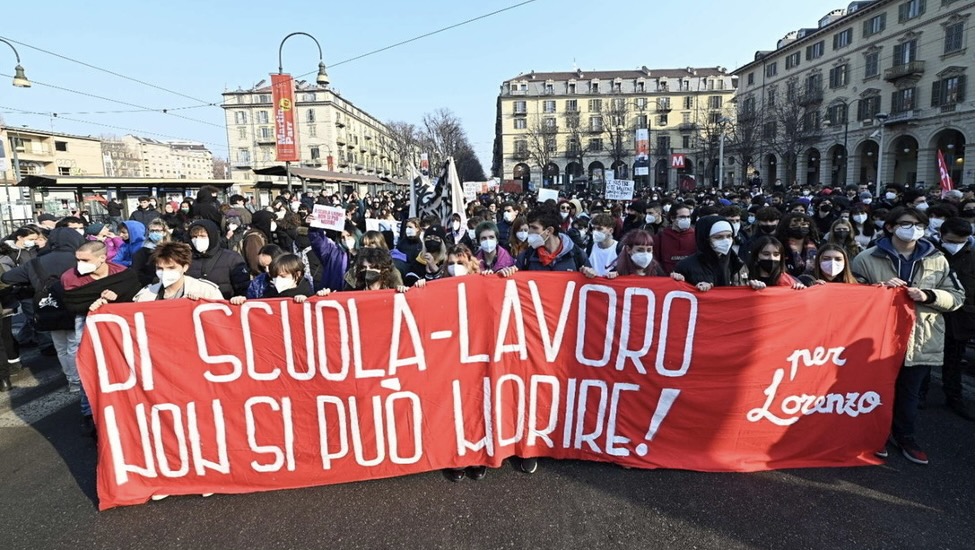The Italian state has launched a retaliatory crackdown to the massive youth and student protests that have been taking place over the last several months. On May 12, 2022, a heavy police operation took place in Turin against 11 students and young people who were protagonists of these mobilizations. They were woken up in the middle of the night and taken to the police headquarters in Turin. They were only released the following morning. Three were sent to the Turin jail, four others were put under house arrest, and four were obliged to the measure of mandatory signing. Among them, two are of Potere al Popolo.
The organization released a statement following the police operation to condemn the criminalization of the young activists and demand their immediate freedom. It added, “We call all progressive forces to stand side by side with Italy’s movement of students, youth and workers in precarious conditions, and activists fighting for their basic rights.”
Youth uprising
At the beginning of 2022, student protests took place all over Italy due to a deadly working accident during mandatory internship for high school students. On January 21, 2022, 18 years young Lorenzo Parelli was crushed to death by a steel girder of 150 kg while working in an internship for a private company in the province of Udine, in Northern Italy.
Only a couple of days later, on February 15, another tragic work-related death took place. Giuseppe Lenoci, age 16, died in a car accident while working in a preparatory labor course. The vehicle ran off the road into a tree in Serra de’ Conti in the province of Ancona. The driver was injured.
Three days after the death of Giuseppe, all over Italy thousands of students took to the streets again, rejecting an education system bent to private profit, an increasingly corporatized school model, and the shameful silence of Education Minister Patrizio Bianchi. Students demanded the abolition of mandatory internship and the resignation of Minister Bianchi himself.
In Turin, student movements organized a big rally in front of the regional headquarters of Confindustria, Italy’s Industrial Federation. After students put pressure at the entrance of the offices as an expression of their anger about the death of two peers in working accidents, the police reacted violently, pushing them back with truncheons. This repression has continued today with the latest arrests.
No to mandatory internships
The student protests went beyond condemning the tragic deaths of Giuseppe and Lorenzo. They were fundamentally about the current educational model and how high school students are forced into free labor which introduces an even higher level of precariousness into Italy’s labor market.
Italian students are forced to spend part of their learning school time in workplaces in one of the most dangerous labor markets in Europe. Italy accounts for over 555,000 work-related accidents and over 1,300 work-related deaths every year, which is more than three every day. The probability of (deadly) accidents increases when young people like Lorenzo and Giuseppe are forced to work without any specific training, experiences and protection.
The youth and student uprising and the corresponding crackdown has unfolded in a moment of great political and social tension in Italy. As outlined by Potere al Popolo in its statement, “In the name of the defense of democracy 2% of GDP is spent on military and wormorgering policies are pushed forward. In the meantime, work-related deaths are continuing due to cuts in welfare and education, the living conditions of young people and the working classes worsen day by day, and – last but not least – social protests are criminalized.”
As in most of the world, in Italy, the COVID-19 pandemic laid bare the fundamental contradictions of the capitalist system and pushed the already precarious and vulnerable sectors even further to the brink. Italy’s youth, forced to endure prolonged lockdowns and virtual learning because of gross mismanagement by the government of the pandemic, has been the key protagonist in the ongoing social, economic, and political mobilizations in the country.
Time will tell whether the arrests, which are part of a campaign to silence this resistance, will be successful, or will it encourage even greater mobilization and solidarity in this crucial time.





